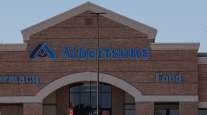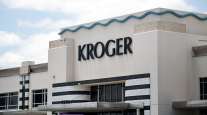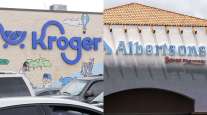Bloomberg News
Kroger Doubles Price Cut to $1 Billion Post-Albertsons Merger
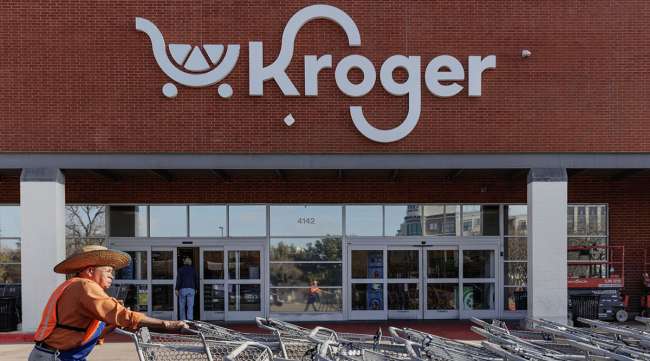
[Stay on top of transportation news: Get TTNews in your inbox.]
Kroger Co. has pledged $1 billion in grocery price cuts — doubling its original commitment — as part of a strategy to win regulatory approval for its $25 billion merger with Albertsons Cos.
Kroger initially committed $500 million to price cuts at Albertsons locations but increased the amount in response to regulatory concerns. The company, which operates chains like Ralphs and Dillons, agreed to acquire Albertsons in October 2022 to better compete against larger rivals like Amazon.com Inc. and Walmart Inc. The deal also includes $1 billion for worker wages and $1.3 billion for store improvements.
Kroger ranks No. 38 on the Transport Topics Top 100 list of the largest private carriers in North America, and Albertsons is No. 40. Kroger and Albertsons also rank Nos. 4 and 5, respectively, on the TT grocery list.
Amazon ranks No. 1 on the TT Top 100 list of the largest logistics companies in North America and the global freight companies list and No. 9 on the private carriers list. Walmart ranks No. 2 on the private list.
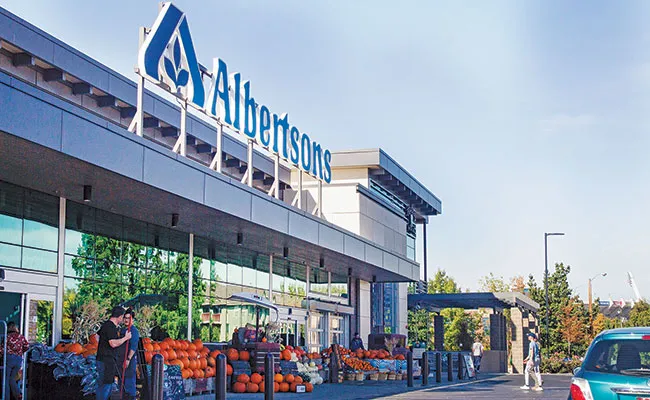
Albertsons and Kroger have already spent more than $800 million on merger-related costs. (Sarah A. Miller/Idaho Statesman via Associated Press)
Regulatory Pushback and Legal Challenges
Since unveiling their plans to merge, the grocers have faced pushback from elected officials and union groups over whether the deal would lead to higher prices for consumers and lower wages for workers. The merger is facing several legal hurdles, including a federal court challenge in Oregon, two state lawsuits and an administrative trial in the Federal Trade Commission’s in-house court.
The legal challenges highlight concerns that the merger could lead to monopolistic behavior, potentially driving up prices and lowering competition in key markets.
It’s difficult to track if companies actually make good on these kinds of promises because big chains operate in so many different markets and sell tens of thousands of products. That means prices can vary widely.
The shares of Albertsons rose after Bloomberg reported the increase in proposed price cuts to products and were up 1.7% at 3:39 p.m. in New York. Kroger’s stock gained 0.4%.
Grocery prices have been top of mind for many consumers and politicians following a period of the highest inflation in decades. While inflation has slowed in recent months, food prices have been among the key drivers of economic discontent because households shop for food every week.
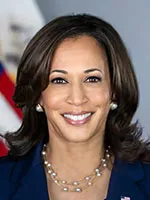
Harris
The grocery industry has now been pulled back into the political sphere, with Vice President Kamala Harris calling for a federal ban on food and grocery price gouging. The move is part of a broader set of initiatives the Democratic presidential nominee plans to use to reduce consumer costs, especially in essential sectors.
The grocers have been working on ways to be more efficient so that they can invest back in prices, employee wages and store conditions, a Kroger spokeswoman said.
Kroger has made similar moves with other deals. The company spent more than $100 million to cut the prices of thousands of products, including staples like eggs and bananas, at Roundy’s after acquiring the chain in 2015. Gross margins declined about 1 percentage point to 24.3% over five years, according a company presentation. Following its purchase of Harris Teeter a decade ago, it invested $125 million in lowering prices and margins dipped to 26.7%, roughly a 2 percentage point decrease over seven years.
Investing more in cutting prices is adding to a merger that’s already racked up costs. The companies have spent more than $800 million on merger-related costs, which consist mostly of fees for lawyers, bankers and consultants. It doesn’t include hundreds of millions of dollars in potential breakup fees the grocers would pay if the deal gets blocked.
Want more news? Listen to today's daily briefing below or go here for more info:


